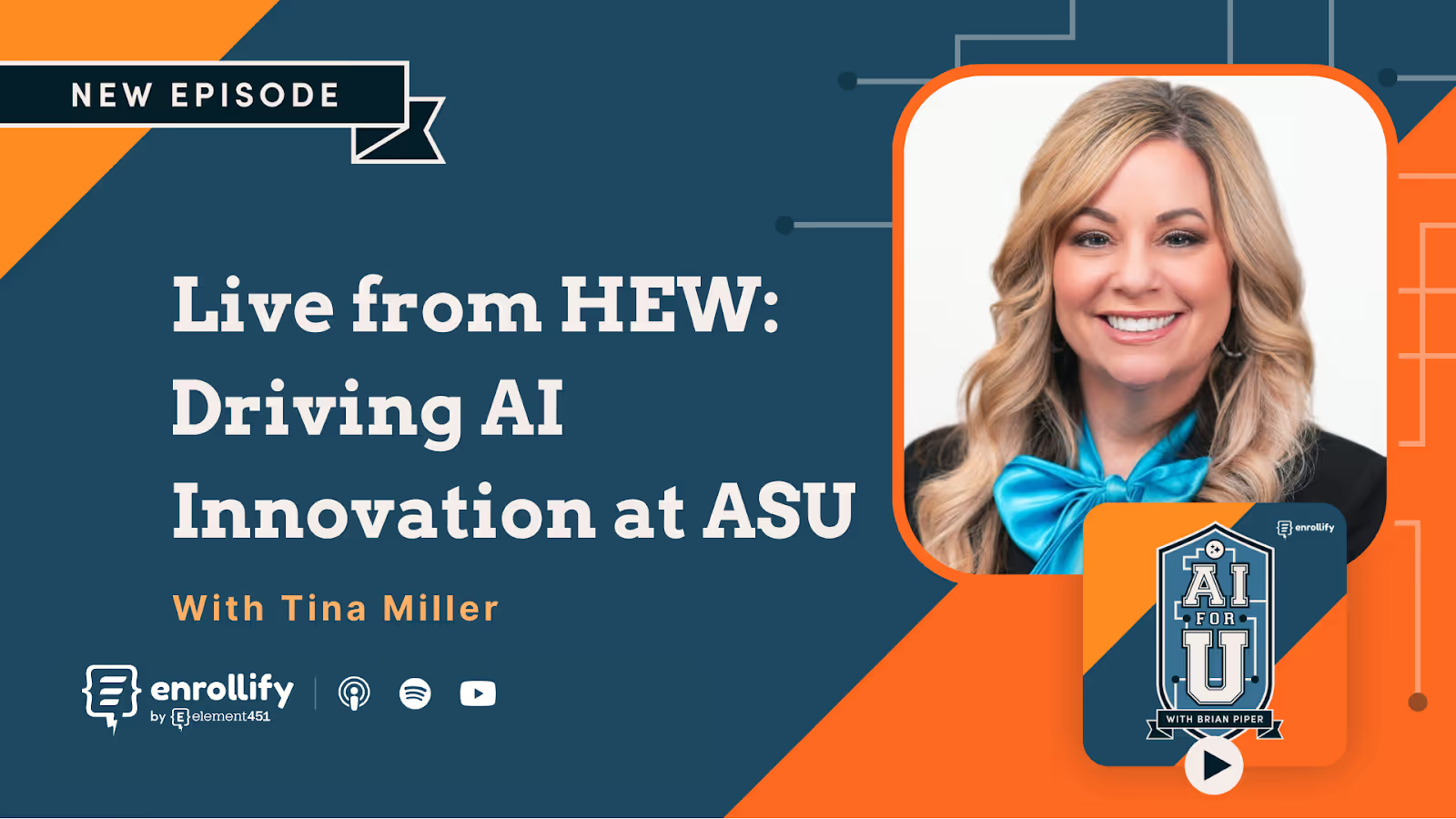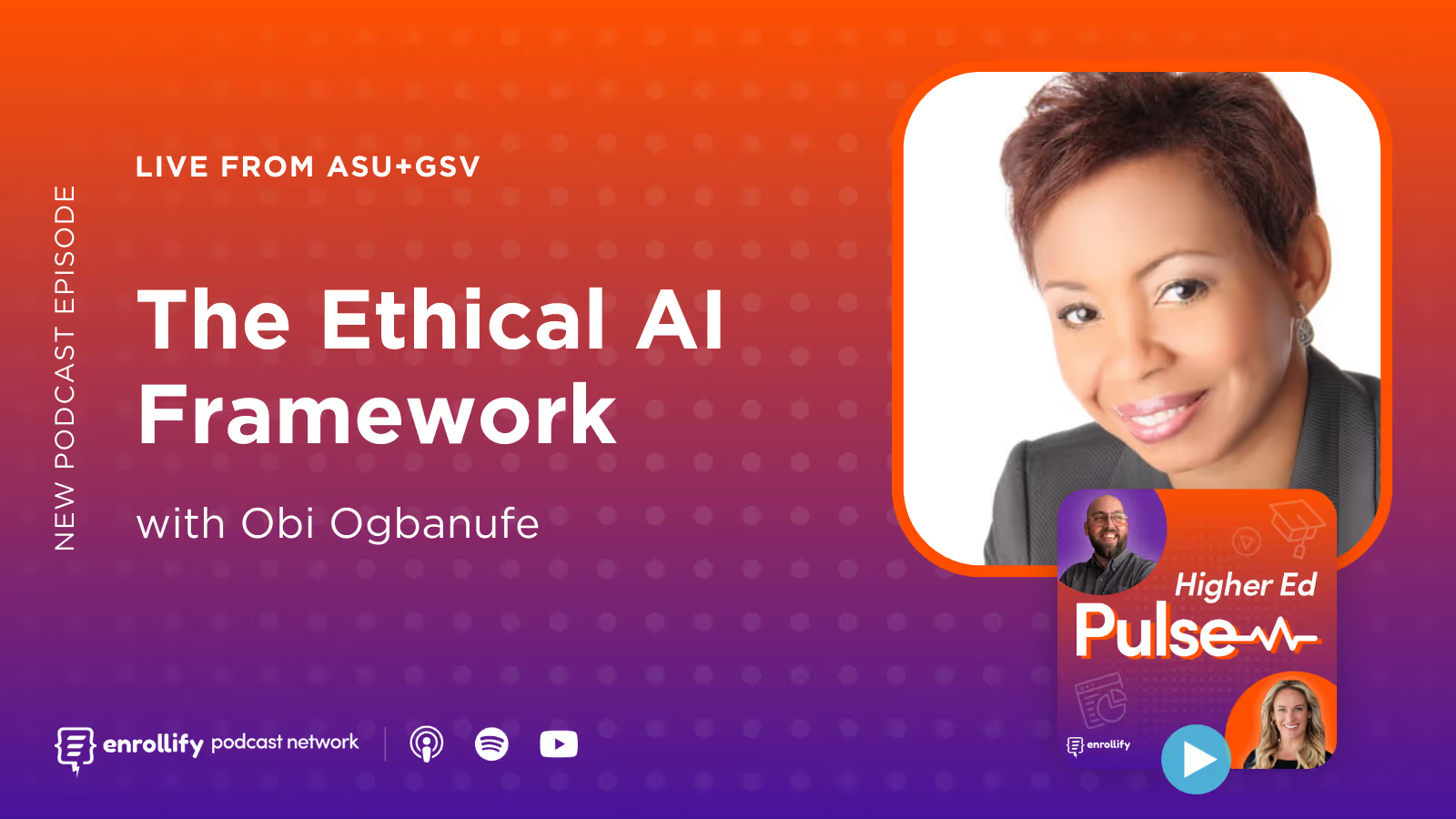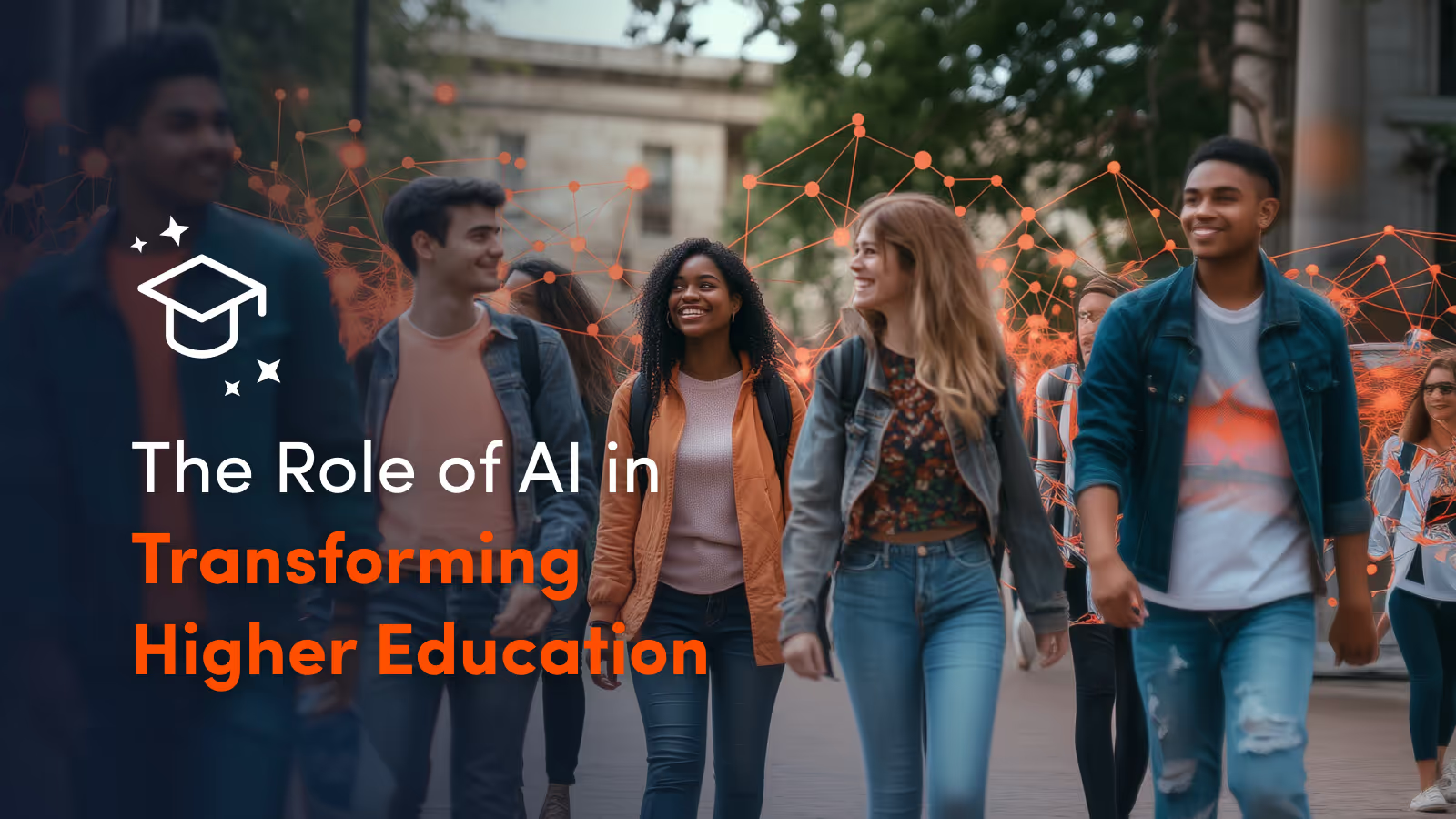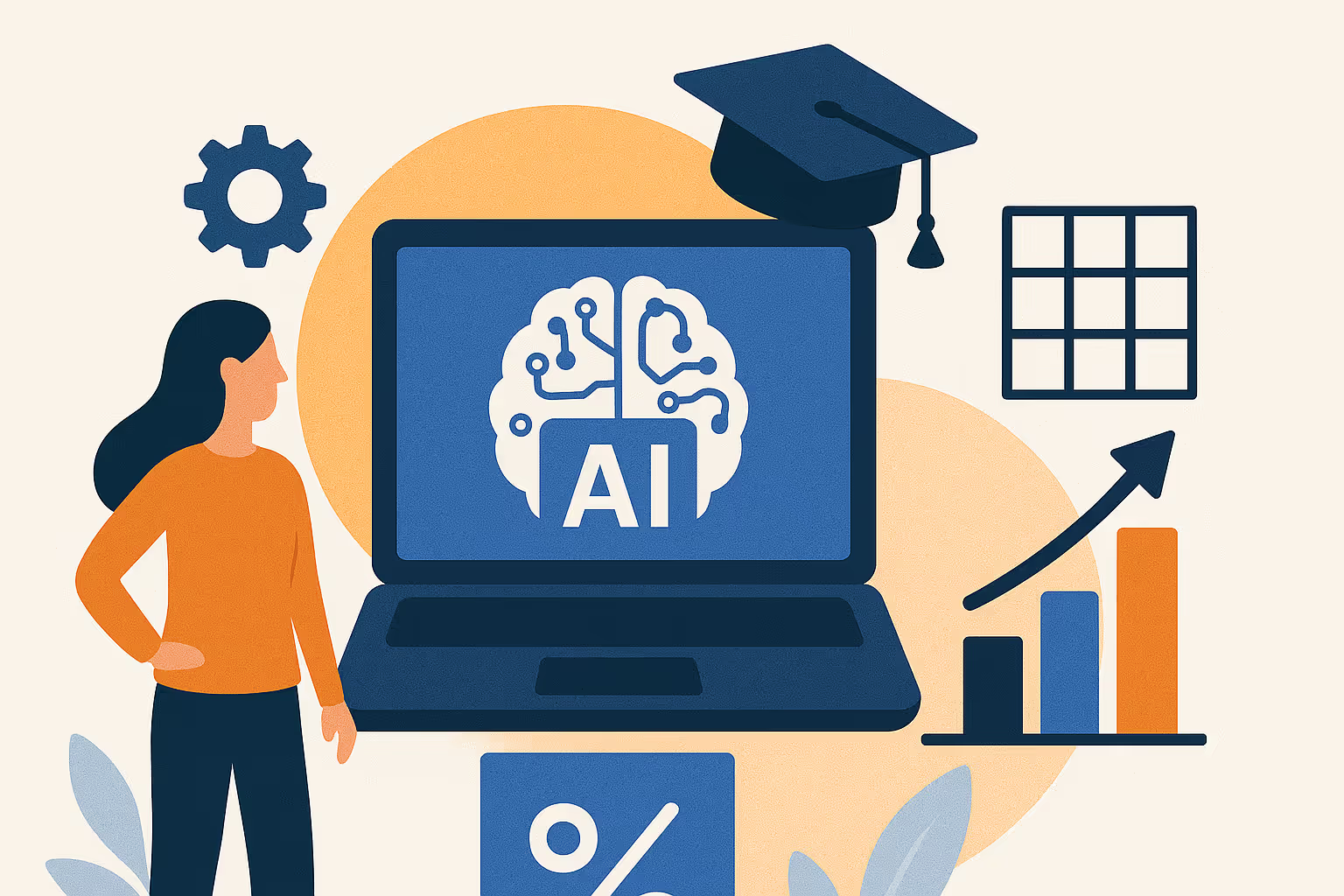About the Blog

Artificial intelligence is transforming higher education by enhancing personalized learning, automating administrative tasks, and improving data-driven decision-making.
The use of AI in higher education is increasing at a skyrocketing rate. Yes, it can automate processes and save your team significant time with daily tasks, but the true benefits of artificial intelligence in higher education go far beyond that. Schools are using AI to fulfill their core missions: improving student outcomes, building stronger human communities, and generating new knowledge.
Learn about the ways AI is transforming and evolving higher education around the globe. This post will explore the growing trend of actionable AI in higher education, highlighting its applications, benefits, and challenges in reshaping the academic landscape.
AI Applications in Higher Education
AI is an overarching term encompassing multiple technologies, including machine learning, large language models (LLMs), generative AI like ChatGPT, computer vision, speech recognition, natural language processing (NLP), reinforcement learning, and more.
Globally, universities are utilizing AI technology across three major categories: teaching and learning, administration, and academic research. Let’s look at some case studies and applications for each of these major areas.
AI in Teaching and Learning
Adaptive learning platforms powered by AI can personalize education to a level never before possible. By using real-time data from a student’s interaction with the platform, these systems can adjust instructional content to each student’s pace in real time to keep learners engaged. The University of North Carolina at Charlotte used this kind of adaptive learning platform to address the high failure rates some students were experiencing in foundational STEM courses.
AI tutors can also significantly improve student performance, according to research by Harvard University on its own physics students. The University of Arizona has developed a website dedicated to AI teaching and learning resources for both students and faculty. And Tina Miller from Arizona State University (ASU) recently spoke with Enrollify’s podcast, AI for U, about ASU’s partnership with OpenAI to explore innovative ways to use ChatGPT to enhance higher education AI Assistants, like the ones developed by Element451, also enhance student learning outcomes by providing round-the-clock advising. AI Assistants can provide academic advising, career coaching, student life guidance, and even program-specific advising to create a holistic support system for students, available 24/7.
Listen to the Episode

AI in Research
In higher education, the use of AI is also transforming the field of academic research. Amid the pressure to publish, academic researchers are incorporating AI tools to help them handle large datasets, indentify patterns, and extract key insights faster and more accurately.
AI can streamline tasks like data cleaning and advanced statistical modeling. AI tools like Semantic Scholar can also power text mining, discovery, and summarization to save academics valuable time in conducting literature reviews and staying up to date on the latest research.
AI can also aid in the peer-review process by helping editors prioritize manuscripts, identify plagiarism, uncover biases in reviewers, and evaluate the quality of research. The academic journal Nature recently published its own paper on AI-assisted peer review and the opportunities and unintended consequences of the technology.
These advances are saving researchers time—and they also may be speeding up the next big breakthroughs and the creation of new knowledge.

AI in Administration
AI in higher education is already transforming the business of running a university and serving the school’s community, from admissions to student support to alumni relations. Automating routine tasks, personalizing communication, and analyzing data is saving administrators time and expense, helping them connect more effectively than ever to their students.
For instance, Forsyth Technical Community College dramatically enhanced communication with prospective students using the Engage CRM by Element451. This led to significant enrollment increases, including a 6% rise in fall 2022, a 12% increase in spring 2023, and a 10% boost in spring 2024.
The use of AI Assistants and chatbots in higher education is also freeing up teams to focus on building relationships with students during business hours instead of handling routine inquiries. These digital assistants are not merely tools; they're partners in the educational journey, specializing in distinct roles. Imagine giving your students a personal academic advisor, career coach, and financial aid advisor—all available at their fingertips, 24/7. This is the reality with the new generation of AI Assistants.
Learn More: 5 Ways An AI Chatbot Increases Enrollment
Benefits of AI in Higher Education
By leveraging AI-powered tools, institutions can transform the educational experience and tackle some of their biggest challenges. Higher education leaders need to think of AI as more than just a tool for operational efficiency. Here is a recap of just a few of the uses of AI in higher education that promote mission-driven, outcome-focused progress.
- Enhanced Learning Outcomes
- AI tutors, adaptive learning platforms, and AI assistants can improve learning outcomes for all types of learners, from Ivy League STEM students to transfer students struggling to pass foundational requirements for their degree. These tools can help level the playing field for non-traditional students and help universities serve new student populations, such as learners in the workforce and non-native English speakers.
- Support for Faculty
- AI tools like Gradescope and Turnitin assist faculty by automating grading and providing detailed feedback. AI can also help with syllabus development and the preparation of course materials. It can also help alleviate the pressure on faculty to publish by supporting their academic research and peer review editorial responsibilities.
- Efficiency in Research
- AI accelerates research processes, identifying patterns and insights that would take humans much longer to uncover. Additionally, AI-powered tools make it easier for researchers to collaborate by enabling real-time data sharing, automating administrative tasks, and even suggesting other relevant research connections. These technologies can significantly speed the pace of discovery and innovation.

Challenges and Ethical Considerations
The rapid evolution of AI in the higher education landscape also comes with challenges and concerns over the ethical AI practices for higher education. The following tips for handling the main areas of ethics in AI and higher education, but this topic is explored in greater detail on Enrollify’s Higher Ed Pulse.
- AI and Academic Integrity
- Your institution should have a clear AI code of ethics that outlines the acceptable use of AI in academic work for both students and faculty. If you learn of an unethical use of an AI tool, it's imperative that you promptly report it before it escalates into a larger issue that could damage your institution’s reputation or harm individuals. As a proactive approach, your institution can also prepare students and faculty with AI training.
- Bias Issues
- AI models are only as good as the data they are trained on, and if this data reflects historical inequalities or biases, the AI will perpetuate those biases. This has the potential to harm your students and compromise the quality of their education. When selecting AI tools, it’s vital to ask the right questions about bias. For instance, does the training data for the AI model reflect the demographics and characteristics of your entire student population? And how has the AI tool been audited to correct for bias?
- Privacy and Data Security
- Schools have additional responsibilities when it comes to AI systems that handle personal data, especially sensitive FERP information or personally identifiable information (PII data) from students or employees. Ask your vendor whether it will use student data to train its models and how they ensure their products comply with state and federal laws.
Listen to “The Ethical AI Framework” with Professor Obi Ogbanufe from the University of North Texas.

Frequently Asked Questions
Are teachers getting replaced by AI?
While AI can assist teachers with certain tasks, it is unlikely to completely replace them. Teachers provide essential human interaction, guidance, and emotional support that AI cannot replicate.
What are the disadvantages of AI in education for students?
One major disadvantage is the potential for AI to limit critical thinking and creativity. AI can also introduce bias into students' critical thinking and open more avenues for plagiarism. Arguments can be made on both sides, however. AI can also help unleash creativity, improve learning outcomes, and accelerate critical thinking.
Why are some schools choosing to restrict AI?
Some schools are restricting AI to address concerns about plagiarism, cheating, and the potential for AI to undermine the learning process. By limiting AI access, however, schools risk hindering their students’ potential learning benefits and readiness for the workforce.
We Love AI! And We Have The Resources To Prove It…
If you’re just getting started with using AI to personalize content and engage with students, we have resources created by the industry’s best AI experts to support you and your institution:
- AI Engage Summit
The AI Engage Summit is your chance to learn from many of your favorite Enrollify creators and institutions that have already harnessed AI’s potential, sharing practical strategies you can implement at your institution. The recordings and slide decks from the October Summit are available for replay now! - Element451’s AI Learning Center
Enjoy a plethora of must-read guides to help you shape your institution's future with AI-powered innovation, including a white paper from Jeff Selingo. - The AI For U Podcast
Unlock the potential of AI at your institution with practical insights from Brian Piper and easy-to-implement use cases tailored for higher education professionals. Stay ahead in your field by learning how to seamlessly integrate AI into your workflows and transform your institution's processes with confidence. - The Generation AI Podcast
GenerationAI, hosted by Ardis Kadiu and Dr. JC Bonilla, is a groundbreaking podcast designed exclusively for higher education professionals who are keen to navigate the dynamic world of artificial intelligence. New episodes drop every Tuesday!










